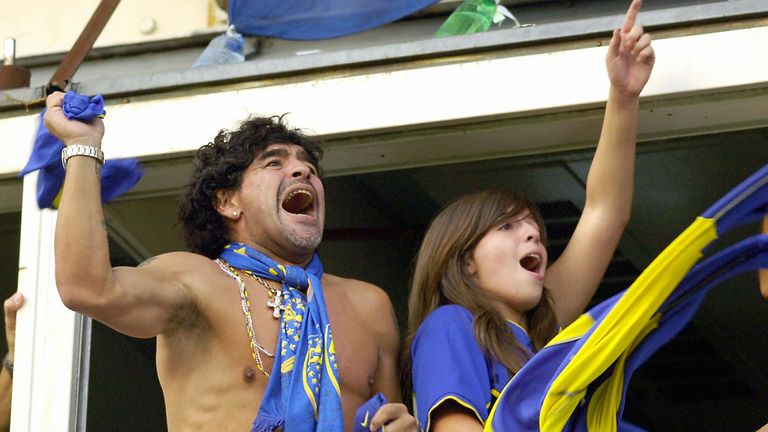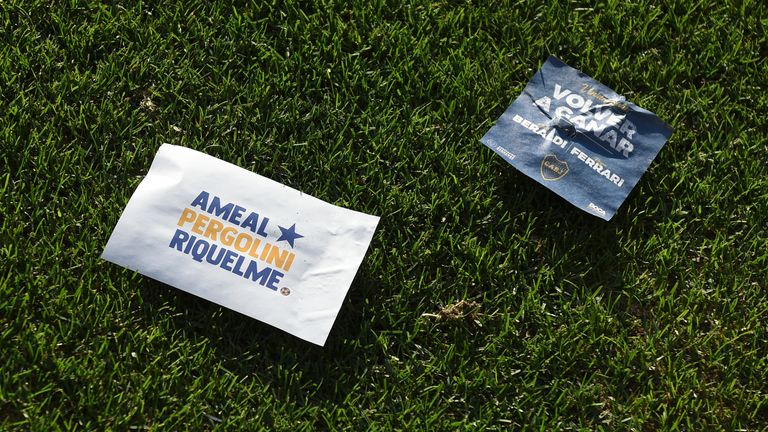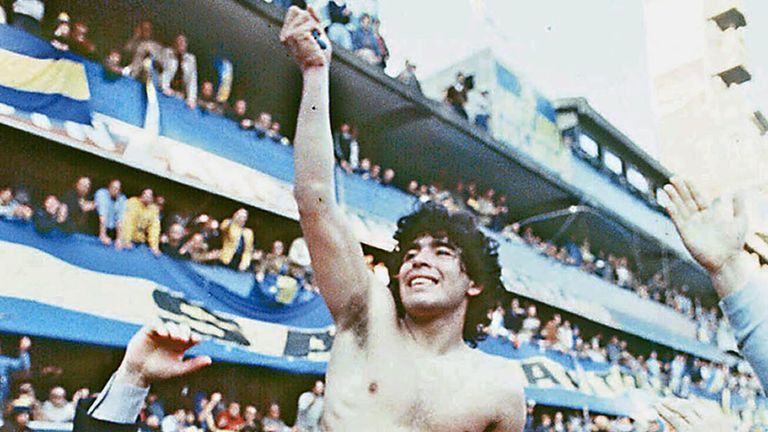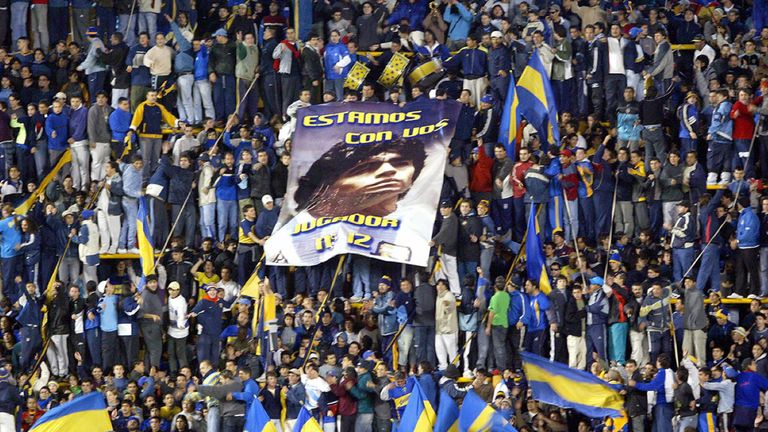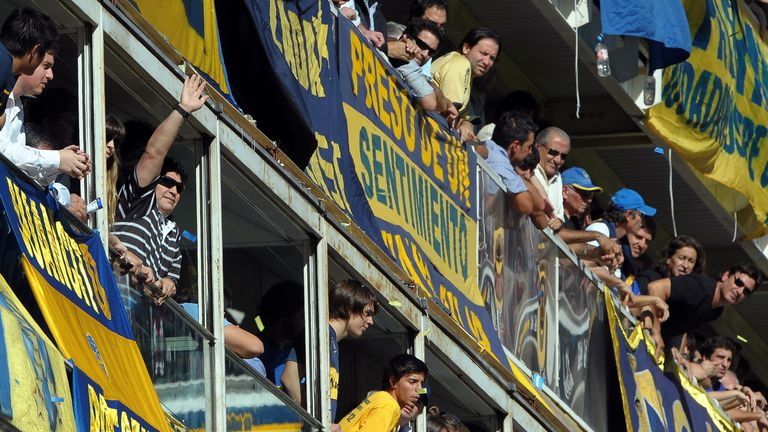Diego Maradona's Boca Juniors feud with Juan Roman Riquelme
Diego Maradona is back at Boca Juniors as coach of Gimnasia La Plata this weekend. Adam Bate reports on an emotional return for an Argentine icon and why his row with newly-elected second vice president Juan Roman Riquelme adds an edge to the day...

Friday 6 March 2020 17:36, UK
The last match of Diego Maradona's incredible career came as a Boca Juniors player in the Superclasico against River Plate at the Monumental. He was substituted with his team a goal down, replaced by teenage hopeful Juan Roman Riquelme. The young playmaker proceeded to turn the game on its head as Boca won 2-1. A new hero had emerged.
This weekend, Maradona returns to the Bombonera, Boca's famous old stadium, as coach of their opponents Gimnasia La Plata.
It is a huge game. With one round of matches remaining, Boca are just one point behind River. They need to win and hope their old rivals slip up. But even with so much at stake, the build-up has been dominated by one man.
A presentation has been planned for Maradona. But all is not well between him and the club he loves. His feud with Riquelme, one that dates back more than a decade, has been reignited.
Riquelme, an icon at Boca, backed Jorge Ameal as his second vice president in the recent presidential elections at the club. Maradona opposed them. Ameal's subsequent victory has opened up fault lines. Supporters are divided depending on age and temperament. Maradona's fall-out with the popular Riquelme has even put his own Boca legacy under the spotlight.
The Bombonera stadium tour offers little hint at the unease. Noelia Casco, the tour guide, cheerily points out Maradona's box just above the scoreboard. The man himself has not visited since 2015 but his eldest daughter Dalma attends more regularly. Inside the club museum, there is a mural dedicated to Maradona's time at Boca.
Deep in the bowels of the Bombonera, the club's greatest heroes have statues dedicated to them. Maradona and Riquelme are there side by side like Roman emperors immortalised in their prime. For the more optimistic in Argentina, this is the Maradona who will be remembered by the Boca supporters when he walks out at the weekend.
"Diego is an icon, a living legend," Veronica Brunati, a journalist with TNT Sports in Argentina, tells Sky Sports. "In every stadium, the reception for Maradona has been spectacular and I imagine it will be very special and emotional for him to return to the Bombonera as a coach. His differences with the leadership are another matter."
The problem is that Riquelme is part of that leadership now. A role reversal that began all those years ago at the Monumental is complete. They had once been team-mates but it was when Maradona held the power - as Argentina's head coach for the 2010 World Cup - that the relationship between the pair soured. Riquelme did not go to South Africa.
There was no mistaking the fact that it was personal. "As long as Maradona is coach I will not return to the national side," he said at the time. "We are not on the same wavelength. We don't agree much. My codes are not his and it is clear that we cannot work together."
Hostilities resumed when Riquelme threw his considerable influence behind Ameal during the elections. "If Riquelme wins, hold on," warned Maradona, attempting to scupper the bid by shamelessly suggesting that a Riquelme victory would precede the appointment of his old nemesis and River legend Daniel Passarella as head coach.
"Diego trashed Riquelme on television and especially on social media," Matias Baldo, a Buenos Aires-based journalist, tells Sky Sports. "He supported Christian Gribaudo instead, who was the candidate from Daniel Angelici's party."
But it would take more than that to diminish the love for Riquelme. So significant is his influence that imagery of the famed No 10 was banned from the ballot paper. The club announced that anyone wearing a Riquelme shirt would not be allowed to vote. It made no difference. Ameal won 52.8 per cent of the support. Gribaudo just 30.6 per cent.
For Baldo, it reflected the attitude of Boca Juniors supporters to the two heroes. "Riquelme is undoubtedly the club's biggest idol," he says. "They loved each other until the fight before the World Cup. But since then they have never spoken to each other and whenever the fans at the Bombonera have had to choose a side they have shown their love for Riquelme."
In some respects, that choice is a straightforward one. Riquelme not only spent six seasons at the club as a youngster, inspiring Boca to back-to-back Copa Libertadores successes, but he returned in his prime. That second spell immediately brought another Libertadores win - in which Riquelme scored three in the two-legged final - and lasted for seven years.
By comparison, Maradona's time at Boca was fleeting. Although associated with the club, much of his time as a player in his homeland was spent elsewhere in Buenos Aires at boyhood club Argentinos Juniors. He scored more goals for them than he did for Napoli. His first stint at Boca lasted only one season. By his second, he was all but finished.
For Boca's younger supporters, those more likely to be influenced by these bald statistics than the magic of Maradona and the intense emotions that he inspired, this means that there is a tendency to feel that his impact on the club can be overstated. For Baldo, that is a mistake because it strips the context from his contribution.
"Maradona's first experience with the club lasted only a year but during that time they won their only title in 16 years," he explains. "He chose Boca over River Plate and helped to expand their reputation into a club that is known worldwide. The older fans really love him. They get emotional when they talk about him and when they remember those days.
"The problem nowadays is that you have a bunch of young people talking on social media. You know how it is. History doesn't matter, only titles. Yes, they think that Maradona is great for what he did with the national team but not because of his days with Boca. They do not accept that Maradona is one of the greatest idols in the club's history."
All of which only adds to the intrigue ahead of his return. When Ameal was perceived to be sluggish about announcing plans for Maradona's return, there was uproar. Gribaudo, who has not given up on a return to power in future elections, was happy to stoke the fire.
"When Maradona comes to the Bombonera," he wrote on Twitter, "the whole stadium and club should treat him with the same affection that Diego has for Boca.
"He who does not love Diego does not love his mother."
Even Ameal's subsequent announcement that Maradona would be given a plate and a jersey commemorating his 1981 title win, was not enough to calm the mood. "Those words, where Ameal showed little desire to pay tribute, only fuelled the controversy," says Baldo.
So, what to expect inside the stadium?
Brunati thinks that Maradona will be cheered and Baldo agrees. "During the last game, fans chanted his name and sang the old songs, while also singing for Riquelme. I think the people that go to the stadium know Maradona is a Boca icon. Maybe it's just the younger or newer fans who just have the image of him from recent years as someone battling Riquelme."
As for Maradona himself, diplomacy remains something for other people.
"I'm not interested in them giving me a plate," he revealed, just as the Boca leadership hoped that the fuss was dying down. "And I say that for everyone, not just for Riquelme."
The Bombonera awaits.

